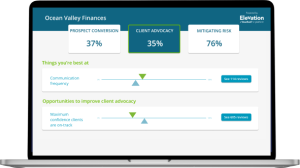Josh Hill, Principal of Efinity, leads a directly authorised mortgage brokerage with five advisers and a simple belief: listening well builds lasting relationships.
For years, the firm tried collecting client feedback through manual questionnaires and Google review links – but responses were scarce. “We just didn’t get much take-up,” says Caroline, Office Manager. “We knew our clients were happy, but we had no way of proving it.”
That changed when they adopted VouchedFor’s enhanced client survey, Elevation.
Engagement rose to 46%, giving the team a clear picture of how clients felt – and uncovering valuable insights into client vulnerability.
Making feedback part of the journey
The key to improvement was simplicity. Instead of treating feedback as an afterthought, Efinity made it a seamless part of the mortgage process.
“Clients are told the feedback request is coming, so it feels natural rather than like an extra job,” Caroline explains.
Feedback management sits centrally with Caroline rather than individual advisers. “It frees them up to spend more time with clients while ensuring the process still gets done,” she says. The result is consistency – and every Efinity adviser now maintains a five-star rating.
Turning insight into better support
Feedback isn’t just collected – it’s acted on. Every comment is read, shared, and discussed in
the office.
“Working in an open-plan environment, we often talk about vulnerability as a team,” Caroline says. “Many of those conversations start with client feedback.”
One case particularly stands out. An elderly business owner in his late 70s seemed fully independent when arranging a later-life mortgage. But feedback revealed signs that he might benefit from more regular contact. “We agreed to check in with him every six months rather than once a year,” Caroline says. “That small change gave him extra reassurance – and gave us peace of mind that we were doing right by him.”
Supporting Consumer Duty with real evidence
For Efinity, Elevation has become essential to demonstrating Consumer Duty compliance.
“All the information I need is there,” Caroline explains. “Without it, it would be difficult to evidence some parts of our Consumer Duty report.”
The insights also shape internal training. Quarterly meetings focus on reviewing feedback themes, identifying where clients may need additional support, and sharing examples of good practice.
Recognition built on genuine client care
That commitment to listening hasn’t gone unnoticed. In 2025, Efinity won VouchedFor’s Small Mortgage Advice Firm of the Year Award – a reflection of their consistent client care and five-star feedback.
“It reaffirms what our clients tell us – that we offer a really good service,” Josh says. “Now
we can back that up with independent validation. It adds credibility.”
For a firm built on referrals, that validation matters. Around three-quarters of Efinity’s new clients come through recommendations – so much so that they don’t actively market themselves. “If we did,” Caroline explains, “we probably wouldn’t be able to cope with the demand.”
The bottom line
Efinity’s journey shows how structured feedback can transform more than compliance – it can build trust, improve care, and strengthen relationships.
As Josh sums up: “We’re responsible for what we do, and we want to make sure we’re doing it right.
Elevation gives us the evidence and the insight to do exactly that.”




